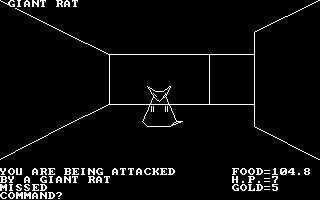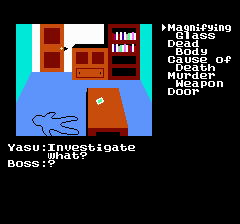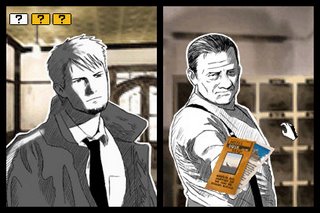A Minor Primer: Japanese Adventure Games
By Mento 8 Comments
Welcome to a series on things I generally don't understand but have picked up enough information about them to apparently be confident enough to write an edifying guide about them? This week it's Japanese adventure games, and next week it'll be "stringing a sentence together".

Japanese adventure games are like JRPGs, in that both genres began at the same origin point for both East and West video game design but quickly diverged and evolved in completely different directions. If I wanted to pull an example from RPGs: Both Eastern and Western RPG fandom began with early games like Wizardry and Akalabeth and Temple of Apshai: Real basic, graphically primitive, no-frills D&D adaptations from the early 80s that paved the way for the similarly fantasy-focused RPGs to come. In the West's case, these evolved to complex CRPGs like Ultima and eventually stuff like Baldur's Gate - D&D has consistently been a big deal in the sort of circles to which computer RPGs cater, and it wasn't until relatively recently that CRPGs kind of broke off from that venerable table-top ruleset (or one like it, like Germany's The Dark Eye) to be their own independent game-by-game thing. Japanese RPGs, of course, took the Wizardry template and added more slimes and dudes with big hair to the constantly-shifting formula, creating Dragon Quest and Final Fantasy and all those crazy tales about saving the world from fetus bosses and Christian mechas and eggbears that came thereafter.
As with RPGs, Adventure games share a similar "Indo-European" primordial origin, in that the earliest adventure games were entirely text-driven types like Zork that could be easily understood and created by fiction-writing developers on either side of the cultural divide. Westerners kind of went from text adventures to stuff like the mouse-driven ICOM MacVentures, those games in which you forget to put on your pants and press buttons knowing full well that it'll kill you, and eventually to the point-and-click graphic adventures that made Sierra and LucasFilm the [> TALK] of the town.
Japanese adventure games, though, went in an almost entirely separate direction:
Beginnings
After moving past text adventures on early computers with typically robotic names like PC-8801 and FM-7, most Japanese adventure games kind of became these menu-driven things in which you had a list of options to choose from ("talk", "look" and the like, sort of like the early SCUMM stuff) and a little window with graphics in it and you basically tried all of the options provided until the game let you continue. There was less emphasis on inventory puzzles and more on paying attention to what NPCs were telling you and relaying it at a future point in the story. This aspect was enforced by how frequently these early adventure games were detective whodunnits, in which clues and information were as valuable as some screwdriver you found in a drawer or a rubber chicken with a pulley in it ("poulet" is french for chicken meat, you know. I wonder how that gag played in the French language version?).

The most notable of which would probably be Portopia Renzoku Satsujin Jiken. Penned by Dragon Quest head honcho Yuji Horii, it was the first big adventure game hit for the Famicom (that's the NES to us) and became one of the four "classic models" of Famicom game from which all others purportedly sprang. Sprung? Spreng? It helps Horii's case that he was a guy who knew what he was doing that he's actually responsible for two of those four models: Dragon Quest (JRPGs) and Portopia - and it's also probably no surprise that ol' Shiggy Miyamoto was responsible for the other two: Mario (side-scrolling platformers) and Zelda (top-down action-adventure games). If you were to look at the output for the Famicom, excluding American games (which tended to be more fist- and gun-based action fare) and arcade ports, any given game will almost certainly have been derived from one of those four exemplars.
Digressions aside, Portopia basically set the standard for Famicom adventure games. Though the West received relatively few - they were probably only slightly more common than Mahjong and Go games, possibly due to the amount of text that would need to be translated - we did get the occasional one like Princess Tomato in the Salad Kingdom. Anyone who played that game can attest to the amount of trial and error guesswork and superfluous 3D maze sequences that were commonplace in Japanese adventure games at the time. Fortunately, with the miraculous future being what it is, many of these old Famicom adventure games have been translated, either by professional developers (as is the case with that Jake Hunter DS game a while back, which included enhanced ports of many of the Detective Saburou Jinguuji Famicom games) or by magnanimous (and/or unemployed) fan translators. They're generally primitive stuff, but an obvious antecedent to the adventure games from that region that we see today. Talking of which:
Endings (or Currentings?)
Japanese adventure games would divert into two types around this point: The classic whodunnit games that required a bit of guesswork from the player, and visual novels in which the player was basically a passive participant but for a few multiple choice decisions. The latter was clearly intended to reach people who perhaps don't play a lot of games but do enjoy fiction. The whole "Choose Your Own Adventure" angle is one that's old as dirt, but also unusually rare for video games at the time.

While we had visual novels going on, there were also more games with hard-boiled detectives in them in which the player had to poke at dead bodies and wring information out of witnesses and track down the dames what done them wrong. This eventually gave way to deliberately throwback modern Japanese adventure games like Phoenix Wright and Hotel Dusk: Room 215: Oft-times a game over resulted from simply not following the clues correctly, getting something wrong and finding oneself in a dead-end with the investigation, as opposed to the rather more visceral game overs that used to be limited to getting whomped on the head by an ogre or falling off a cliff or touching absolutely anything on an alien planet in Space Quest.
Chances are, if you were to pick up an adventure game made in Japan, it would either be one of those visual novels (which may or may not include naked people hugging each other) or a whodunnit mystery game with a bit more interactivity to it. Maybe a combination of both, like Phoenix Wright - it's kind of clever about how it does that: The investigations are the "classic" Famicom adventure games with all the examining and item-finding, while the court scenes are more like visual novels in which the player is expected to answer questions correctly to move the plot forward.
There's probably far more nuance in games in this genre then I'm giving them credit for, but the primary focus of any Japanese adventure game is to tell a story. How often these games deign to allow the player in on all this story-telling and decision-making is dependent on the game in question.
Conclusion
Man, this all reminds me that I need to play 999 already. Can't believe how tricky it is to track down a reasonably priced copy. Hasn't Nintendo ever heard of digital distribution? Rasslefrasslegrumblegrumble...

8 Comments